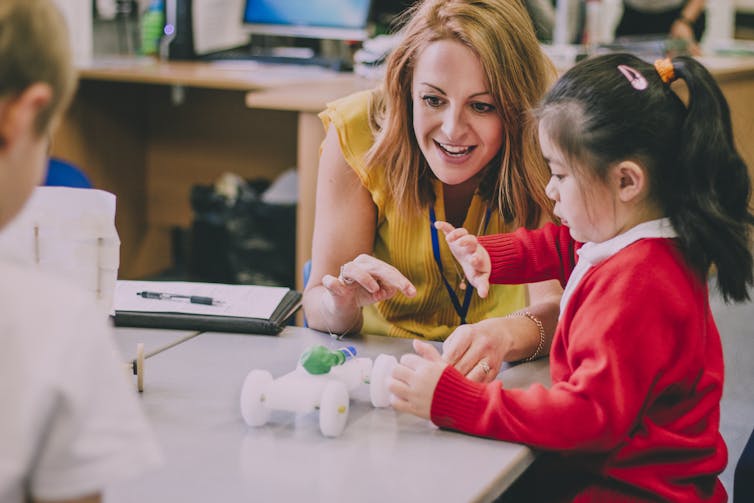What democratic schools can teach us about how to implement Gonski 2.0
- Written by Rebecca English, Lecturer in Education, Queensland University of Technology
Gonski 2.0 makes 23 recommendations to change Australia’s education landscape . The federal government has accepted all of those recommendations.
David Gonski will present his report at the special COAG meeting on May 4. The federal education minister will need to secure the support of all states and territories.
While these recommendations suggest major change to current education practice, democratic schools have been implementing many of these ideas for 40 years. They provide a model for how states and territories could proceed.
Democratic schools and their philosophy
Democratic schools are student-centred, with individualised learning and progression plans. They avoid age grouping or “year levels”. These schools put individual student’s needs at the heart of the school and the learning. They report student’s learning and progression in relation to students as individuals.
Read more: Gonski review reveals another grand plan to overhaul education: but do we really need it?
Democratic schools operate in many countries across the world. They are based on a belief we need to work against a cookie-cutter approach to education. These schools individualise instruction and base learning on the individual needs of the learner.
 Democratic schools report learning and progression.
Shutterstock
Democratic schools report learning and progression.
Shutterstock
Tech giant Apple is an advocate for democratic schools. They argue that by implementing the democratic schools’ model, we can achieve greater social cohesion, improve social mobility and ensure a fair and equitable education for all.
Others have found, for more than 40 years, these schools successfully foster in students a sense of success and an ability to manage their learning. These skills are predictors of later life success.
Gonski’s recommendations
In his recent review, Gonski made several recommendations that are aligned with democratic education. The three priorities are:
measure growth and learning based on where students start, not based on their age
ensure children are engaged and connected learners prepared for a changing world
make the system adaptive, innovative and improve it to meet students’ needs.
All of these recommendations are already implemented in democratic schools.
 While we still know little about how the recommendations will be implemented in practice, we can learn a thing or two from democratic schools.
Shutterstock
While we still know little about how the recommendations will be implemented in practice, we can learn a thing or two from democratic schools.
Shutterstock
These schools are adaptive to student’s needs, in innovative curriculum, assessment, reporting and behaviour management.
The report also calls on early learning to provide a seamless transition into school, as is the case where preschools and primary schools are connected. Kinma School, for example, provides a model of how transition can be effectively managed from pre- to primary school. They have the children visit throughout the year to familiarise themselves with teachers, other kids and the environment, and allow parents to stay in the classroom with their child until the student feels comfortable on their own.
The Gonksi report states education should equip “every student to grow and succeed in a changing world”. As noted by many democratic schools, there’s no way of knowing what students need to know. So, they allow students to determine their overarching topics of study, to pace and manage their learning based on their strengths, interests and needs. They also focus on the development of problem solving and students’ abilities to be change makers in the community.
There is also an emphasis on timely, ongoing feedback in the report. Democratic schools argue feedback to learners is more important than one-off assessments. Feedback, as opposed to assessment, allows students to manage their learning in partnership with teachers and facilitators.
Further, technology is vital to Gonski’s recommendations. The report notes it can be used to enhance and measure students’ learning.
 There is already evidence of democratic schooling working in practice.
Shutterstock
There is already evidence of democratic schooling working in practice.
Shutterstock
In democratic schools, technology is central to the development of the individual as a learner, to accessing ideas and information that was previously unavailable. It also democratises the role of the teacher as facilitator and not an overarching expert in all things.
Some democratic schools in the US use technology to manage teacher development by videoing teachers in class and helping them use that data to improve their performance.
It can be done, and done well
Some may argue many of these reforms are impossible to implement. But there is evidence of elements working in practice, in Australia and overseas.
Democratic schools are already working within the Gonski recommendations, including the multi-age philosophy at Kinma, Currambena and Pine Community School. There is also a noticeable approach to flexibility, at Templestowe College in secondary and senior secondary school.
Read more: Democratic schooling: teachers leave them kids alone
The importance of the learner is central to Gonski’s report and to wider discussions about how we engage students in education that benefits them and the community in the 21st century. While we still know little about how the recommendations will be implemented in practice, we can learn a thing or two from democratic schools.
Authors: Rebecca English, Lecturer in Education, Queensland University of Technology




